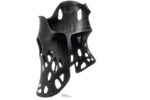Gill highlights custom sensors expertise with industry flexibility
Product offering encompasses specialist level sensing, condition monitoring, position sensors and engine control products for composites-based applications.
Gill’s capacitive-level sensors (top left) are used in motorsport and UAVs, for example, while its noncontact position sensor option (bottom right) can be tailored to position items relative to one another. Source | Gill Sensors and Controls
(Lymington, U.K.) offers OEMS design and manufacturing expertise for the development of custom sensor solutions tailored to specific application needs, including some using composites technologies. Between its dedicated project team, and its long history of successful bespoke projects, Gill says it provides problem-solving solutions using engineering innovation; robust, low-maintenance sensors with no moving parts; and trusted sensor quality and reliability, suitable for harsh environments.
Composites-related projects in which these sensors have been implemented include an F1 drag reduction system (DRS) rear wing position sensor, the Bloodhound composite supersonic car (SSC) for liquid level and position sensing, sensors used in motor racing and even liquid level measurement in composite tanks used in marine applications.
Gill has also included noncontact position sensors on composite racing yacht rudder applications, and Gill WearDetect oil debris sensors in wind turbine gearboxes.
The company specializes in providing products for level sensing, real-time ferrous wear detection, noncontact position sensing and engine controls, with high performance and reliability. Its facilities include R&D, manufacturing, sales and customer support but Gill also sells its products worldwide through a long-established base of distributors.
Related Content
-
Smartbeam develops HMS-embedded composite profiles for space
Project goals adapted filament winding to properly integrate optical and carbon fiber sensors and meet technical requirements, resulting in a verified, simplified process for smart composite structures at reduced cost.
-
MiniLab consortium produces first full-scale thermoplastic composite hydrofoils
Project advances toward first recyclable foils for ocean racing, part of “Infinite Foil” finalist for JEC Innovation Award 2025.
-
Measuring energy use to enable sustainable composites production
Airbus subsidiary CTC uses new technology to measure energy use in machine components and processes to optimize equipment, production lines and guide decisions for future composites.



